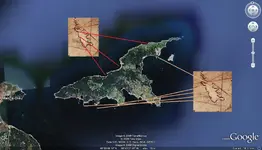That's the thing, the Templar fleet was sent out, some boats went towards the Scandinavian Peninsula were Templars integrated into there daily life, some boats followed the African coast, but the majority of Carvelas journeyed to the new land Of Canada, United States, and Brasil where they started new lives, treasure some gold, you are looking for stuff they used to begin a new life, throughout history people have had to take what they had at hand things they value books, some valuables, family and tradition but the Templar's greatest treasure where there lands there castles there power and influence and you cant pack that.
What is this assertion based on? It's both generally accepted and completely plausible that some of the non-French Templars packed up and left after the order was dissolved, but it's poorly documented. What is documented is that for the most part, they didn't have to leave. We know that a significant portion of them simply joined other orders. When the pope dissolved the order, he neither stated nor implied that they all had to die; he simply said that they couldn't call themselves Templars anymore, and he didn't seem particularly pleased to have to do so.
As has been previously mentioned on this forum, the Templars in Portugal simply changed their name and went right on with business as usual, operating like this for centuries until the Knights of Christ were eventually secularized. This doesn't strike me as a group of people who were worried about lasting repercussions stemming from continued persecution. Once it was over, it was over. Thus, self-imposed exile might have seemed attractive to certain Templars for a variety of reasons, but outside of France and probably England, I don't think that it was absolutely necessary by any means.
Would I like to find a treasure or the Grail, yes, but you have to remember that at the time the Templar's where trying just to survive, I know many believe the Templar's went to Scotland and England but one must remember when the Pope sent out his Decree there already where Templar's in England and Scotland, there lives were also in danger for the majority of Templar's especially those the central Europe was to get as far as possible...
For example there are rumors and facts of German solders at the end of WW2 fleeing out of Europe to North and South America there is even proof of German expats establishing themselves in parts of Africa..."Its Human Nature to Survive".
The facts prove that the Templar's established there wealth after returning from Jerusalem but at the same time we all must remember that most Templar's where aristocrats, yes there is a Treasure But said Treasure is Knowledge and an Artifact....
Just one more thing the Templar's in the New World of North and South America did not need to hide a treasure, the power of the Vatican could not reach that far.....
Scotland would have been a good place for an ex-Templar to run to. Robert the Bruce was no friend of the church, having been excommunicated several years before all of this took place; he was also no friend of the English, who had also gone above and beyond the call of duty in their persecution of the Templars. (Likely for the same reasons that Philip had.) Did any of them go there? It's plausible and logical, particularly when we're discussing English Templars. We may never know for certain.
It's interesting that you mention Germans fleeing Germany after WW2. Central and South America were obvious choices not only because they were far away, but also because (and this is important!) there were existing and well-established German communities already there. A German man fleeing to a town where everybody looked, spoke, and acted differently than he did would cause him to stick out like a sore thumb, but a German man fleeing to a town full of Germans that had been there for multiple generations would not only allow him to blend in intially (and be somewhat sympathetic to his plight), but would also simplify and speed up his transition into his new life. This is also why Germans wound up in Africa. (I believe that German was actually an official language of South Africa until 1990.) Likewise, a German fleeing to America would know that this would be a risky move, but he'd be able to count on that same support system; every major city and plenty of smaller ones would have a neighborhood populated with Germans. A European fleeing to the New World in the 14th century would have had none of these advantages, but would have been faced with a hazardous journey to even get there, surviving in a new and unfamiliar place, and somehow making friends with locals who were not known for treating strangers kindly.
Could it have happened? I suppose. Almost anything
could have happened. But did it? There's little hard evidence to support it, and it's a pretty elaborate theory that requires some faith in order to work.
 Perhaps I had better clarify it a bit more, I do not necessarily believe that the map in a fib, but only that it is not to Oak Island.
Perhaps I had better clarify it a bit more, I do not necessarily believe that the map in a fib, but only that it is not to Oak Island.  Perhaps I had better clarify it a bit more, I do not necessarily believe that the map in a fib, but only that it is not to Oak Island.
Perhaps I had better clarify it a bit more, I do not necessarily believe that the map in a fib, but only that it is not to Oak Island. 









